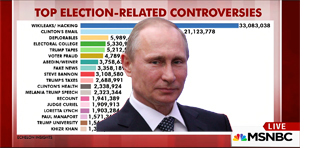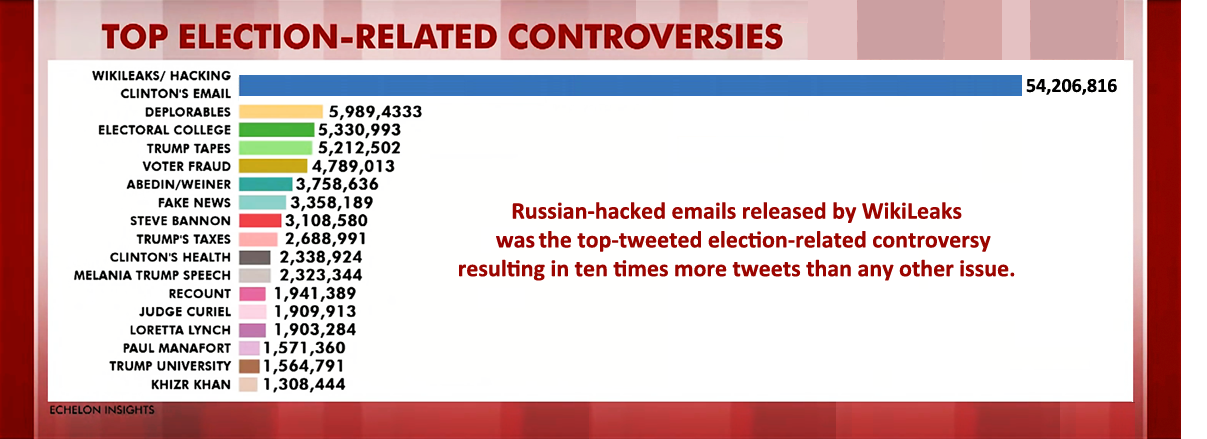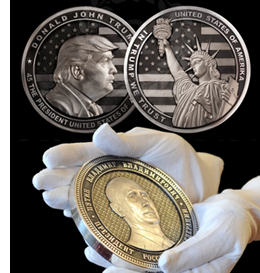DID THE RUSSIANS WIN THE ELECTION FOR TRUMP?

According to information obtained and validated by 17 U.S. intelligence agencies, Vladimir Putin, in an attempt to influence the results of the presidential election, personally directed the hacking (break-in and theft) of private emails of the Democratic National Committee and other Democratic Party operatives including Hillary Clinton's campaign manager. He then proceeded to oversee the dissemination and leaking of those emails through Wikileaks and other Russian-paid "trolls" posing as Trump supporters tweeting on social media. (A troll is someone who sows discord on the Internet by posting inflammatory messages in an effort to upset or disaffect people or disrupt things.) This is fact. The question is: Were the Russians successful? Pundits tell us the answer is no because the Russians didn't interfere with the physical operation of voting machines or counterfeit actual vote tabulations. That analysis is supported by 100% of Trump voters as well as some Clinton supporters but as we shall see, just because an opinion is popular, does not make it true.
Winners get the bragging rights, but Mr. Trump's win was far from the momentous groundswell of support he asks us to believe. This year above all others it's important to understand just how precarious the election result actually was. Trump spokespeople point to his 306 electoral votes and the number of counties he won in key states. Those things are true but don't give the full picture. For one thing, as is well known, Hillary won the popular vote by close to 3 million votes. That gives Mr. Trump by far the worst ever voter deficit among winning presidential candidates in the 200+ year history of presidential campaigns. The second largest deficit for a candidate who went on to become the president occurred in the 2000 election when George W. Bush received 544,000 fewer votes than Al Gore yet still won in the Electoral College. Trump's 2.8 million+ shortfall was five times sorrier. Mr. Trump's attempt to cast doubt on that shortfall by claiming the existence of 3 - 5 million fraudulent votes from illegal aliens has been repudiated by reports from the 50 State Attorneys General (most of whom are Republicans) which failed to uncover a single voting conspiracy anywhere in the country.
A presidential candidate needed 270 electoral votes to win in November 2016. Trump ended up with 306 and Clinton 232. Three states decided the election in favor of Trump with an average margin of 0.72 of 1% of the vote. (Michigan went to Trump by 0.25 of 1%, Wisconsin by 0.78 of 1 % and Pennsylvania by a hair above 1% of the vote. It's been calculated that a total of only 78,000 votes from those three states were all that stood in the way of a Clinton victory. Winning the election by 3/4 of 1% in three states does not exactly evidence a Trump landslide.
With an appreciation of just how delicate was the Trump victory, it is worth asking: What issues could have swung 1% or more of the vote in the final days and weeks of the general election? Unfortunately, when the question is phrased like that, what you mostly get are opinions from the same media outlets and pundits who became so misdirected and confused during the election cycle; opinions such as Hillary needed to communicate more effectively to white middle class workers, that she didn't campaign enough in certain states, or (most unkindly) that she was not a very likeable candidate. Such opinions are of no value. What is needed are facts, i.e. things that can be proven to exist by visible evidence. An 'opinion' may or may not be based on facts, and opinions from those who got it so wrong for so long should be treated with some skepticism. Fortunately this election afforded the opportunity to obtain a direct, unbiased, and definitive answer to the above question. It has been stated that this was the first "Twitter Election" after the 3-4 Trump messages tweeted out at 3 A.M. each morning emerged as one of his signature campaign devices. Some have gone so far as to attribute Trump's win to this new weapon, but it turns out the Twitter Universe is far greater than those few daily Trump tweets. In the four months of the general election there were over 45 billion individual social media messages sent on Twitter alone. Wouldn't it be great if we had a way to interrogate that social media activity to find out what election controversies actually DID concern and captivate the interest of the American public?
Enter Kristen Soltis Anderson.
 Ms. Anderson, a Republican analyst and co-founder and Partner of Echelon Insights, is one pollster who knows how to think. She crunched the Twitter numbers to isolate the election-related controversies that most caught the interest and concern of the American public. The results are astounding. Neither taxes, the economy, the Mexican Wall, Immigration, China nor even jobs ranked among the top 18 hottest subjects in the 100 million election-related tweets examined by Anderson's organization. Neither did race or women's rights.
Ms. Anderson, a Republican analyst and co-founder and Partner of Echelon Insights, is one pollster who knows how to think. She crunched the Twitter numbers to isolate the election-related controversies that most caught the interest and concern of the American public. The results are astounding. Neither taxes, the economy, the Mexican Wall, Immigration, China nor even jobs ranked among the top 18 hottest subjects in the 100 million election-related tweets examined by Anderson's organization. Neither did race or women's rights.
The unchallenged, indisputable winner (with 10 times more tweets than the runner up and 20 times more tweets than most of the other topics on the list) was the Russian-hacked emails released by Wikileaks. The full list from Echelon Insights is provided below, extracted from data presented during an interview with Ms. Anderson on an MSNBC Morning Joe segment from Dec. 30, 2016. The following data from Ms. Anderson is also extracted from that interview.
Twitter Tweets Tell the Tale
"My company, Echelon Insights, takes a look every year at what people have been tweeting about in the news. We take a look at a whole host of topics, dozens upon dozens upon dozens of things. And what we found in 2016 is that the election dominated everything.
"Take a look at the topics that really drove this election. For the most part people were not tweeting about the election that much until we got into general election season (at end of the summer.) We found that the Wikileaks story and the hacking of the DNC and the Podesta emails far and away dominated Twitter conversation about the election. Part of that has to do with the way that story kept coming up. You have things like Trump University, a scandal/controversy that popped and then went away. Whereas stories about the emails--Hillary Clinton's email server and the State Department or emails that had been hacked from the DNC and from John Podesta--those stories kept coming back over and over and over again leading to the total volume of those topics far out-pacing anything that was negative about Donald Trump.
"When you looked across which audiences were talking about the topics on our list, Wikileaks and the hacking popped much higher among people who were not political activists and Beltway elites. Other stories would pop once and then they'd go away. The Trump Access Hollywood tape was probably the biggest of the anti-Trump stories--it had a really big spike and then it went away, whereas with Wikileaks and the hacked emails, you started at the Democratic Convention with the DNC, and it continued to build, continued to have new spikes and new revelations throughout the course of the late summer and into the fall.
"What's notable is that when we looked across all those different audiences, the Wikileaks and hacking story ranked more highly among people we had identified as not being politically active on one side or the other. For political people within the Beltway orbit, so much discussion of the other issues had already occured during the primaries that their minds had been shaped in a very differnt way. Most other people began to check into this election after the primaries were over, after we got through the conventions, so they were all seeing things through a different lens. These were folks tuning in much later in the process. So the scandals and stories that had rocked things in the primaries and which had colored the way that political activists were seeing things, were not being seen in the same way by the vast majority of ordinary people that were chattering on Twitter."
Here's the complete list of hot topics, extracted from the same MSNBC Morning Joe segment.

To repeat the original question: Did the Russians win the election for Trump?
The above chart makes it clear that they did. The initial release of Russian-hacked DNC emails was orchestrated to occur just 3 days before the Democratic National Convention in the summer of 2016. This threw the Democratic Party into confusion and forced the resignation of its chairman. From that day through to the November election, new "leaks" were made regularly, multiple times every week. During the 4 months to the election, Trump hammered home this message several times every day while reinforcing it with his 'Crooked Hillary Campaign' and cheerleading chants of "Lock her up." He also continuously linked the Russian-hacked emails with Clinton's private emails. This is how the Russian-hacked emails selectively released by Wikileaks became the dominant conversation and primary indoctrination into the politics of the election for the majority of voters. The image created was that Clinton could not be trusted, despite the fact that the leaks contained not a smidgeon of Hillary misdeeds. The news outlets inadvertently forwarded this Russian propaganda campaign by disseminating the Russian/Wikileaks data, but as we now know, the most important audience was the social media audience and this story totally dominated social media for the entirety of the general election process. When the FBI Director chose to go public with the possible existence of more Clinton emails found on a staff computer, it achieved such traction only because of all the previous work the Russians had put into inciting opinion against Clinton on account of her emails. There are those who say, "But the emails were real emails, not false news." Maybe so, but that is a disengenuous argument and one that actually proves the success of the Russian operation. The Russians had also hacked Trump emails and data but failed to release them. Can there be any doubt that if they had systematically released personal emails from Trump or any of his family, or advisors instead of Clinton's, there would have been far more scintillating and salacious stories to disaffect the American public with Mr. Trump. As covered on another page of this web, Mr. Trump is the least transparent President ever elected to the office. Had the Russians wanted to, there was no shortage of Trump secrets available for leaking that would have soured far more voters on Trump than were needed to put the election into Clinton's hands.In Trunp We Trust

So yes, the Russians did it. Aside from the Twitter data there's plenty of corroborating evidence they wanted Trump to win. During the election campaign Russian State media portrayed Hillary as a raving witch for her consistent criticisms of Putin, before during and after her tenure in the State Department. When Putin invaded the Ukraine she went so far as to liken him to Hitler. In contrast, Russian State media heaped praise on Trump during the campaign and his win elated Russian political elites and power brokers. It was reported that In the days following the election his victory was celebrated in bars and restaurants across Russia. This Russian enthusiasn is best seen in the action of a group of Russian businessmen with ties to Putin minting a set of oversized Sterling silver and solid gold commemorative coins to honor President Trump. The coins are nearly 5 inches wide with a picture of Trump on one side and the Statue of Liberty on the other over the inscription: "In Trump We Trust." These Russian businessmen formed their company three years ago to mint the same size solid gold coins in praise of Vladimir Putin after he and the Russian military 'annexed' Crimea by force in 2014 in violation of Internatiional treaties. (The Putin coin is the one at the bottom of photo.) Likely explanations for the hacks and subsequent release of material:
- b) Putin wanted to get rid of Clinton.
- b) Putin was playing not only Trump but the entire USA.
- c) Trump and Putin were colluding.
- d) A combination of more than one of the above.